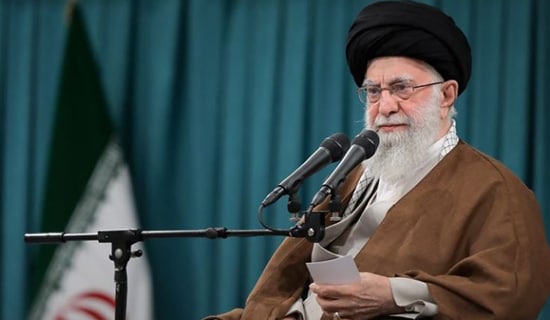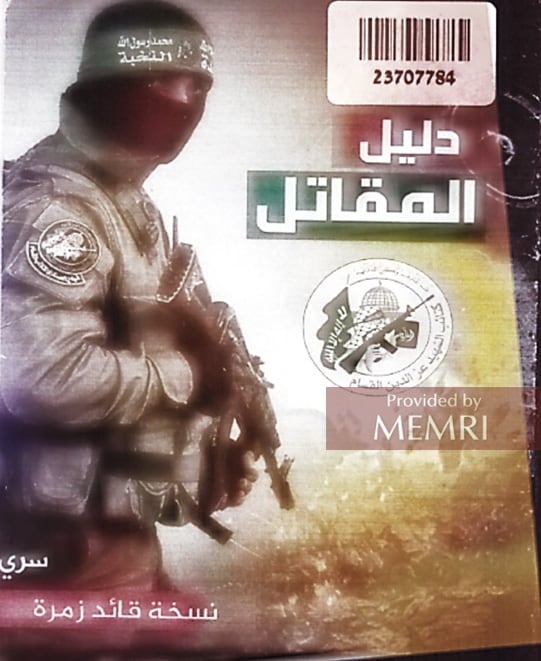
Cover of "Daleel Al-Muqatil" – "The Fighter's Guide"
Introduction
The atrocities committed by Hamas mujahideen in southern Israel on October 7, 2023 were carried out in the name of Islam, and for the sake of serving Allah's will. Hamas's activity, like that of other Islamist terrorist organizations, has its roots in Islamic religious sources, and aims to emulate the deeds and actions of the Prophet Muhammad and his seventh-century Companions.
This article examines the religious aspect of "Daleel Al-Muqatil" – "The Fighter's Guide" – which is an operational guide for squad commanders in Hamas's military wing, the Izz Al-Din Al-Qassam Brigades. The guide provides its readers, who as Hamas fighters are Islamists, with a protocol of mental, spiritual and tactical preparations to be carried out and actions to be taken before, during, and after their attacks, through recitation of Quranic verses, supplications, and directives. An analysis of the guide provides insight into the religious/combat doctrine – and indoctrination – of the Hamas mujahideen who carried out the October 7 attack and its atrocities.
I. "Daleel Al-Muqatil": Islamist Indoctrination And Its Tactical Applications
The Operational Level
The guide combines operational directives with religious instruction for attaining pure religious intent while engaging in jihad. It is clear that the Hamas mujahideen who participated in the atrocities of October 7 saw their commanders not only as military leaders but also as religious authorities, entrusted with setting tactical goals as well as religious and spiritual goals.
The guide can be divided into two main sections:
Pages 1–9: This part includes praise for jihad, describes the Paradise that is promised to mujahideen, and supplications to Allah (duʿāʾ/adʿiya) to be recited during various military activities and battlefield scenarios.
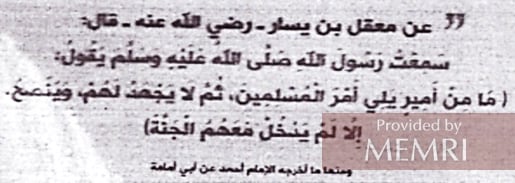
From the guide: "On the authority of Ma'qil bin Yasar, may Allah be pleased with him, who said: I heard the Messenger of Allah, peace and blessings be upon him, say: Any leader who takes charge of the affairs of the Muslims and does not strive for their welfare and sincerely advise them, will not enter Paradise with them"
Pages 10–30: Include operational and tactical procedures: instructions for command and control, communications and logistics, reconnaissance and ambush, assault, the capture of prisoners, and disengagement from combat, as well as instructions. The operational section incorporates elements of religious Islamic ritual.
The guide addresses Hamas operatives as mujahidoon and the highest-ranking field officer as Amir (leader). It provides instructions for meditation-style focusing techniques for the mujahid to achieve pure religious intention, commands him to observe obligatory practices, especially the five daily prayers, and encourages the execution of non-obligatory practices (such as duʿāʾ and fasting).
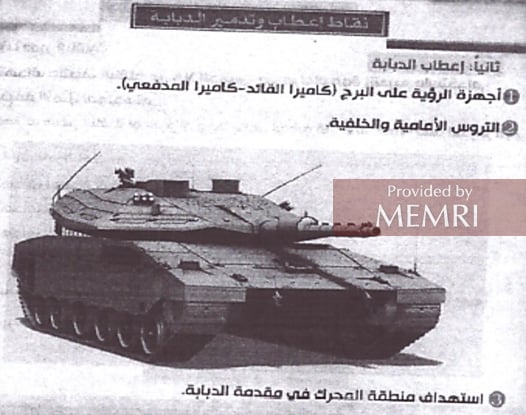
Israeli Merkava tank for targeting. Text above reads: "Tank’s targeting points for incapacitation and destruction." The guide advises aiming for the "tank's engine, located in the front."
The guide's terminology combines operational and religious terms so that the mujahid can understand what is expected of him on the tactical level, through associating the tactical goal with the Islamic source from which the terminology was borrowed. Two examples illustrate this:
-
Ghazwa: One of the military actions is called ghazwa (literally, "raid," "invasion," or "pounce"). This term refers to a tactic incorporated by the Prophet Muhammad in his campaigns against unbelievers, which often involved an incursion into their territories.
-
The Duʿāʾ of the Village: A specific supplication is to be recited upon arriving at a village, enemy or otherwise.
The religious terminology used in the guide is not merely technical; it is used as a means of shaping both the mujahid's self-perception and his view of the enemy: The enemy camp is portrayed as a religious adversary and referred to not just as the "enemy' but also as the "unbelievers" (Kuffar) and "the infidel Jews."
Pure Intention: Religious-Operational Guidelines For Commanders
The guide meticulously instructs commanders to instill a devoutly religious mindset aligned with Islamic teachings, both in themselves and in their subordinates. Commanders are directed to focus their intentions solely on acting in the service of Allah. This religious requirement for pure intention is well known in Islamic tradition and rooted in early Hadith literature.
The notion of purity of intention in the guide has both psychological and ritual dimensions. Psychologically, commanders must ensure that their motives for engaging in jihad are purely for Allah and that they do not include anger, revenge, pride, the pursuit of honour or wealth, or the like, as these can impact the mujahid's spiritual reward in Paradise.[1] Commanders ritualistically express their intent aloud through a standardized protocol of voicing commitment to Allah's commandments.[2] This ritual, along with another known as tajdid al-niyya (renewal of intention), is mandated by the guide to be conducted at various stages of preparation and combat.
Commanders are also instructed to participate in tathqif (educational programs) to enhance their knowledge through lectures and courses and train them to serve as exemplary role models for the mujahideen under their command.
The Daily Religious Life of Hamas Mujahideen
The guide provides insights into the daily religious practices of Hamas mujahideen, highlighting their intense religious indoctrination. They are instructed to spend extended periods together, as evidenced by a rations chart in the guide that details what they are to eat over a period of 10 days. Much of their time in the operational compound is dedicated to training and indoctrination provided by their commanders.
It describes a strict religious way of life for mujahideen during their extensive time together. They practice two voluntary rituals communally in order to show their heightened religious devotion:
-
Remembrance of Allah – This ritual involves the recitation of Allah's 99 names, as well as other formulas of remembrance (adhkar). Commanders are instructed to have enough collections of adhkar as well as "electronic beads," simulating a misbaha rosary, to aid in the practice.
-
Optional fasts – These fasts, which are observed outside of Ramadan, are a common voluntary ritual among Muslims. The guide sets out these fasts on the fourth and eighth days of the rations chart.
II. Detailed Religious Content From Daleel Al-Muqatil: Translations And Analysis
The opening page consists solely of two Hadith traditions, along with an instruction to maintain the confidentiality of "this guide." These traditions are cited to warn the commander to take his responsibility very seriously, lest his fate in the hereafter be dire.
First Hadith
"On the authority of Ma'qil bin Yasar, may Allah be pleased with him, who said: I heard the Messenger of Allah, peace and blessings be upon him, say: Any leader who takes charge of the affairs of the Muslims and does not strive for their welfare and sincerely advise them, will not enter Paradise with them.[3]
"And among them ]additional narrations on the same topic[ is what Imam Ahmad reported on the authority of Abu Umama."
Second Hadith
"The Prophet, peace and blessings be upon him, said: 'Any man who is in charge of ten or more people, Allah, the Mighty and Majestic, will bring him on the Day of Judgment shackled, his hand tied to his neck. His righteousness will free him, or his sins will destroy him[4]. Its beginning is blame, its middle is regret, and its end is disgrace on the Day of Judgment.'[5]
"Narrated by Ahmad and al-Tabarani."
The first page begins with the Islamic phrase Bismillah Al-Rahman Al-Raheem (In the name of Allah, the Most Compassionate, the Most Merciful), which serves as a religious preface for the entire guide. The rest of the page is dedicated entirely to a single Quranic verse, displayed across the page in large, ornate script. This is the well-known verse on jihad, Sura 8:60, which reads:
"Make ready for them whatever force and strings of horses you can, to terrify thereby the enemy of Allah and your enemy, and others besides them that you know not; Allah knows them. And whatsoever you expend in the way of Allah shall be repaid you in full; you will not be wronged."[6]
The verse advocates:
-
A full-force assault on the battlefield.
-
The instilling of fear in the hearts of the enemy, a goal that sheds light on the horrors of October 7 and the significant efforts made by Hamas to livestream and post online the atrocities committed by its mujahideen.
-
The regarding of enemies not only as the enemies of Muslims and Islam, but first and foremost as the enemies of Allah. Consequently, the mujahideen are instructed to rely on their religious leaders – those authorized to interpret Allah's will – for direction in identifying whom they should fight. This absolute obedience to religious authorities may also have played a role in the atrocities committed on October 7.
-
The theme of a "profitable transaction" – that is, everything that mujahideen expend for the sake of Allah will be returned to them in the fullest. This theme is further elaborated later in the guide with regard to Paradise. Additionally, the spoils of war seized from the enemy, after whom this sura is named (Al-Anfal, "The Spoils of War" ), are mentioned here as well.
Dedication Page
This page is an address to the readers, containing the motif of Paradise promised to those who fight the unbelievers. It states:
"Unto the souls of those who preceded us to the heights, paving the way for us: our venerable Sheikh Ahmed Yassin and his auspicious brethren.
"Unto all who have watered the soil of Palestine with their pure blood... Unto the fuel of the coming victory and the heroes of liberation... The brave martyrs of preparation
"Unto all who sacrifice the flower of their youth in the depths of prisons... The prisoners of glory and freedom
"Unto those who have sold their souls cheaply in the path of Allah [sacrificed their lives cheaply for the cause, the path of Allah]: the leadership and soldiers of the Martyr Izz ad-Din al-Qassam Brigades
"Unto the unknown soldiers and those who tread the paths of divine faith - the men of Allah who have excelled and distinguished themselves
"We hereby present unto you the Fighter's guide, beseeching Allah, The Most High, The All-Powerful, to make your jihad sincere for His sake alone, and to guide your arrows true to the hearts of the enemies of Allah."
Pages 3-6: "Introduction In Praise Of Jihad"
The four-page introduction, comprising Quranic verses and passages of commentary, is devoted entirely to assuring the mujahideen of the Paradise awaiting them in the hereafter.
The Quranic verses promise them tremendous reward in Paradise and the interpretative passages following each verse, drawn from hadiths and authoritative sources, are aimed at enhancing the reader's anticipation of reaching Paradise.
At the top of Page 3, Verse 95 of Surah 4 extols the virtue of those who go out to wage jihad, elevates them above those who do not, and promises them great reward:
"Such believers as sit at home – unless they have an injury – are not the equals of those who struggle in the path of Allah with their possessions and their selves. Allah has preferred in rank those who struggle with their possessions and their selves over the ones who sit at home; yet to each Allah has promised the reward most fair; and Allah has preferred those who struggle over the ones who sit at home for the bounty of a mighty wage."[7]
At the bottom of Page 3, Verse 111 of Surah 9 states that Allah Himself has promised, in the Torah, the Gospel, and the Quran, to purchase the souls and possessions of those who fight for Him, with Paradise as their compensation, and that none is more faithful than Allah in keeping His promise:
" Allah has bought from the believers their selves and their possessions against the gift of Paradise; they fight in the way of Allah; they kill, and are killed; that is a promise binding upon Allah in the Torah, and the Gospel, and the Koran; and who fulfils his covenant truer than Allah? So rejoice in the bargain you have made with Him; that is the mighty triumph."[8]
Page 5 opens with Verses 10-13 of Surah 61 dramatically amplifying the description of the "profitable transaction" that Allah has made with the mujahideen: their sins will be forgiven, they will enjoy the delights and rivers of Paradise, and the victory they yearn for is near at hand.
"O believers, shall I direct you to a commerce that shall deliver you from a painful chastisement? You shall believe in Allah and His Messenger, and struggle in the way of Allah with your possessions and your selves. That is better for you, did you but know. He will forgive you your sins and admit you into gardens underneath which rivers flow, and to dwelling-places goodly in Gardens of Eden; that is the mighty triumph; and other things you love, help from Allah and a nigh victory. Give thou good tidings to the believers!"[9]
Passages Between Quranic Verses
The guide includes passages from Hadiths and further segments of commentary, almost entirely taken from Ibn Kathir (d. 1373), Ibn Qayyim Al-Jawziyya (d. 1350), and the modern Saudi Quran commentator Abd Al-Rahman al-Sa'di (d. 1957). These sources reflect the level of familiarity with religious literature expected of the reader. Two of these sources, Ibn Kathir and Al-Sa'di, are quoted without mentioning their names, while Ibn Qayyim al-Jawziyya is referenced in the guide simply as "Ibn Qayyim, may Allah have mercy on him."[10]
The First Passage: Ibn Kathir's Commentary And The Hadith:
"The divine discourse ignites within the soul, yearning for salvation and immortality, the impulse to excel and compete, and to attain the highest ranks. It hearkens to Allah's preference for the jihadist faction who sacrifice all they possess as a price for His pleasure. [Here begins Ibn Kathir's quotation, with no external indication marking the transition[11]:[ The Almighty has proclaimed the favor He has bestowed upon them: elevated degrees in the lofty chambers of Paradise, forgiveness of sins and transgressions, and the bestowal of mercy and blessings as an act of grace and honor from Him.
"The explanation of these lines is found in the Hadith narrated by Abu Sa'id Al-Khudri, may Allah be pleased with him, upon the Prophet, peace and blessings be upon him:
"Verily, in Paradise, Allah has prepared one hundred levels for the mujahidun [those who fight] in His cause. The distance between each two levels is like the distance between the heaven and the earth. So when you ask Allah [for something], ask Him for Firdaus, the highest, for it is the best of Paradise and the highest part of Paradise, and above it is the Throne of the Most Merciful, and from it spring the rivers of Paradise."
The Second Passage, Featuring Al-Sa'di's Commentary:[12]
"Allah, the Exalted, gives truthful news and promises a certain deal — a tremendous transaction and great exchange. He has bought from the believers their selves and their possessions — this is the price, and the item sold. Against the gift of Paradise, which contains all that the souls desire, the eyes delight in, from pleasures, joys, beautiful maidens, and elegant homes.
"The terms of this contract and exchange are that they offer their lives and wealth to Allah through jihad, fighting His enemies to elevate His word and manifest His religion. This is a promise Allah, the Highest, has bound upon Himself in the Torah, and the Gospel, and the Koran, the most noble, exalted, and complete of scriptures that have ever graced the world. Delivered by the most perfect of messengers, the most steadfast of the resolute ones,[13] and all of them agreed upon this true promise: Paradise will be theirs for those who offer this price.
"So know, O believers, that you are making this deal with Allah Himself, and who fulfils His covenant truer than Allah? This is your profitable transaction with Allah, for indeed, your bargain is profitable. Your Lord has granted you abundant gifts and great rewards, and you have attained a great victory.
"If you wish to understand the greatness of this transaction, consider who the purchaser is – none other than Allah, Glorified and Exalted be He. Consider the reward, which is the greatest and most noble of all rewards: the Gardens of Bliss. Consider the price, which is your very selves and wealth, the most beloved things to a person. And consider who facilitated this transaction – it is the most noble of messengers, peace and blessings be upon him. And through which book was this contract recorded? It was written in the greatest of Allah's revealed books, sent down to the best of creation."
The Third Passage, Featuring Ibn Qayyim al-Jawziyya's Commentary[14] and Concludes with Two Hadith:
"Ibn Al-Qayyim, may Allah have mercy on him, said:
"The verses of the Book and the texts of the Sunna have mutually reinforced each other, repeatedly encouraging jihad, urging it, praising its people, and informing them of the various types of honor and abundant rewards that await them from their Lord. So, the souls have become eager for this profitable commerce that the Lord of all Being, the All-Knowing, the All-wise, directs them towards, as He says: "You shall believe in Allah and His Messenger, and struggle in the way of Allah with your possessions and yourselves." [Qur'an 61:11]
"It is as if the souls were reluctant to give up their lives and survival, so He says: 'That is better for you, did you but know.' [Qur'an 61:11] Meaning, that jihad is better for you than sitting back in pursuit of life and safety.
"And it is as if they said: What do we stand to gain from this jihad? So, He responded: 'He will forgive you your sins and admit you into gardens underneath which rivers flow, and to dwelling-places goodly in Gardens of Eden; that is the mighty triumph.' [Qur'an 61:12]
"Then it is as if they said: This is for the Hereafter, but what about the present world? So, He said: 'And other things you love, help from Allah and a nigh victory. Give thou good tidings to the believers.' [Quran 61:13]
"By Allah, how sweet are these expressions, how closely they cling to the hearts, and how powerfully they attract and guide them to their Lord. How delicately they touch the heart of every lover, and how greatly the heart is enriched and its life sweetened when their meanings touch it. We ask Allah from His bounty, for He is Generous and Noble."
Summary Of The Guide's Introduction, With The Prophet's Words – Two Hadith Traditions
The introduction concludes with two Hadiths in which the Prophet conveys to his companions the merit of waging jihad:
"It is narrated from Sa'd ibn Abi Waqqas that a man came to prayer while the Prophet, peace and blessings be upon him, was praying. When the man reached the row, he said, 'O Allah, grant me the best of what You grant Your righteous servants.' When the Prophet, peace and blessings be upon him, finished the prayer, he asked, 'Who spoke just now?' The man replied, 'It was me, O Messenger of Allah.' The Prophet, peace and blessings be upon him, said, 'Then your steed's legs are cut [in battle, so that it will be slain], and you will attain martyrdom.'[15]
"It is also narrated from Abu Hurayra, may Allah be pleased with him, that a man from among the companions of the Messenger of Allah, peace and blessings be upon him, passed by a valley with a spring of fresh water, and he was captivated by its pleasantness. He said, 'If only I could withdraw from people and settle in this valley. Yet I will not do so until I seek the permission of the Messenger of Allah, peace and blessings be upon him.' He mentioned this to the Messenger of Allah, peace and blessings be upon him, who said, 'Do not do that, for the standing of any one of you in Allah's cause is better than his prayer in his home for seventy years. Do you not wish that Allah should forgive you and admit you to Paradise? Fight in the cause of Allah, for whoever fights in the cause of Allah, even for the interval between milking a she-camel, Paradise is guaranteed for him.'''[16]
Pages 7-9: Essential Prayers (Ad'iya) For The Mujahid
The title of this section, "Essential Prayers (Ad'iya) For The Mujahid," suggests that the listed prayers are only a selection from the many possible ad'iya with a focus on those that are particularly important for the mujahid.
The ad'iya are prefaced by a description of the circumstances under which they should be recited: "Requesting Victory Over The Enemies"; "What The Mujahid Says As He Prepares To Depart"; "What He Says Upon Leaving His Home"; "What He Says Upon Arriving At The Place Of Stationing (Ribat) "; "What He Says Upon Entering A Village"; "What He Says When He Fears The Enemy And His Surprise Attack"; "The Muslims' Slogan When They Fear A Night Attack By The Unbelievers"; "What Is Said At The Time Of Combat"; "The Supplication For One Who Targets The Unbelievers"; "The Supplication For The Fighting Group That Performed Admirably"; "Praising Allah After Victory"; "What He Says When He Returns From His Raid [Ghazw] And His Place Of Stationing [Ribat]"; and "What Is Said If Some Muslims Are Captured."
Since these ad'iya were first recited by the Prophet Muhammad under circumstances supposedly similar to those encountered by the Hamas mujahideen today, their recitation serves to both emulate the Prophet's actions and to foster a sense of closeness to him. The recitation of the same supplications he recited prior to embarking on his own campaigns – some of which were waged against Jewish tribes – strengthens the mujahid's perception that today's Jews are the successors to, and counterparts of, the enemies in the time of the Prophet.
"Requesting Victory Over The Enemies"
The recitation of this particular verse, the final verse of Surah Al-Baqarah (2: 286), is believed in Islamic tradition to be one of the most effective supplications for seeking Allah's assistance:
"Allah charges no soul save to its capacity; standing to its account is what it has earned, and against its account what it has merited. Our Lord, take us not to task if we forget, or make mistake. Our Lord; charge us not with a load such as Thou didst lay upon those before us. Our Lord, do Thou not burden us beyond what we have the strength to bear. And pardon us, and forgive us, and have mercy on us; Thou art our Protector. And help us against the people of the unbelievers."[17]
The guide presents the following duʿāʾ immediately below this verse:
"O Allah, fight the unbelievers who turn people away from Your path, who declare Your messengers as liars, and send upon them Your wrath and punishment. O Allah, fight the unbelievers who were given the Book, O Allah of truth."[18]
This duʿāʾ is mentioned in the sources as a supplication recited by the Prophet during the battle of Uhud (in 625), in which the non-believers from Mecca attacked the Muslims in Al-Madina but eventually retreated back to their city.
Immediately following this is a well-known duʿāʾ through which the reciter seeks protection from Allah:[19]
"O Allah, grant us victory over our enemy and let us see our vengeance upon them."
"What the Mujahid Says As He Prepares To Depart"
"O Allah, You are my support and my helper; by Your power I advance, by Your power I attack, and by Your power I fight."
According to many sources, this was the duʿāʾ recited by the Prophet whenever he set out for a raid (ghazw). [20]
"What He Says Upon Leaving His Home"
"In The Name Of Allah, I place my trust In Allah. O Allah! I seek refuge in You from going astray or being led astray, or slipping or being made to slip, or from committing wrong or being wronged, or acting ignorantly or being treated with ignorance."
Many sources state that the Prophet would say this duʿāʾ every time he left his home.[21]
"What He Says Upon Arriving at the Place of Stationing (Ribat)"
"I seek refuge in the Perfect Words of Allah from the evil of what He has created."
Many sources mention that the Prophet instructed the recitation of this duʿāʾ, which is attributed with protective qualities, upon arriving at a place of residence. It is worth noting that this duʿāʾ utilizes the wording of Quran Verse 113:2, with Surahs 113 and 114 traditionally acknowledged to have special amuletic power.[22]
"In the Name of Allah, with Whose Name nothing in the heaven or on the earth can cause harm , and He is the All-Hearing, the All-Knowing."
In many sources, the Prophet's words are cited, stating that the repetition of this duʿāʾ provides protection from all harm.[23]
"What He Says Upon Entering A Village"
"O Allah, Lord of the seven heavens and what they overshadow, Lord of the seven earths and what they carry, Lord of the devils and what they lead astray, Lord of the winds and what they scatter, we ask You for the good of this town and the good of its people, and we seek refuge in You from its evil, from the evil of its people, and from the evil of what is within it."
Sources recount that the Prophet would recite this duʿāʾ upon seeing a village he intended to enter.[24]
"What He Says when He Fears the Enemy And His Surprise Attack"
"O Allah, we place You as a shield against them, and we seek refuge in You from their evils."
Sources recount that when the Prophet feared a group of people, he would recite this duʿāʾ.[25]
"The Muslims' Recitation When They Fear a Night Attack By The Unbelievers"
"If you suffer a surprise attack at night from the enemy then say: 'Ha Mim, they will not be granted victory."
The use of this invocation by Muslims during the Prophet's time in a nighttime attack on Muslims is mentioned in numerous sources, some of which hold that this occurred specifically during the Battle of the Trench (Al-Khandaq).[26]
It is important to note that this combination of the two letters Ḥa Mim (حم) is one of the fawātiḥ - letter combinations that open 29 of the surahs in the Quran, with this specific combination opening seven of them.
"What is Said At The Time Of Combat"
"O Allah, Revealer of the [holy] Book, Mover of the clouds, Defeater of the Confederates, Swift in taking account, O Allah, defeat the Confederates, O Allah, defeat them and shake them and grant us victory over them."
This duʿāʾ is mentioned in numerous sources as having been recited by the Prophet during the Battle of the Trench, when seeking divine assistance against the confederate tribes (Al-Ahzab).[27]
It is important to note that this was the battle in which the Jewish tribe of Banu Qurayza were accused of breaking their covenant with the Prophet and aiding his enemies – an accusation that led the Muslims to wage war against the tribe, resulting in the massacre of the men and the selling of the women and children into slavery.
A subheading here reads: "Seeking Refuge From Incapacity, Cowardice, And Laziness":
"O Allah! I seek refuge in You from anxiety and sorrow, and I seek refuge in You from incapacity and laziness, and I seek refuge in You from cowardice and miserliness, and I seek refuge in You from overwhelming debt and from the oppression of men."
Many sources indicate that the Prophet frequently recited this supplication.[28]
"The Supplication For One Who Targets The Unbelievers"
"O Allah, guide their shot and grant them their supplication."
Many sources mention that the prophet recited this duʿāʾ. According to some of these sources the Prophet asked Allah to grant the prayer requests of one of his renowned companions and to ensure that when he shoots, he will not miss his target.[29]
"The Supplication For The Fighting Group that Performed Admirably"
"O Allah, bless it, and its horses and its men."
Several sources recount that this blessing-oriented duʿāʾ was recited by the Prophet in the context of successful combat by his followers against unbelievers, who ultimately converted to Islam.[30]
"Praising Allah After Victory"
"There is no God but Allah, alone. He strengthened his army and made His Slave victorious, and He Alone defeated the confederates. There is nothing after Him."
The Battle of the Trench, in which the confederates were ultimately repelled and the fate of the Banu Qurayza Jews was sealed, forms the intense historical backdrop for this duʿāʾ attributed to the Prophet.
"What He Says When He Returns From His Raid [Ghazwa] And His Place Of Stationing [Ribat]"
"There is no God but Allah, alone, there is no partner with Him. His is the dominion and His is the praise, and He is able to do all things. We are returning, we are worshipping, we are prostrating to our Lord, and we are offering praise. Allah fulfilled His promise, granted victory to His servant, and He Alone defeated the confederates."
This du'a, also known as the supplication recited by pilgrims returning from the pilgrimage to Mecca, was reportedly recited by the Prophet upon his return from a military campaign (ghazwa) or from pilgrimage, whether for Hajj or Umrah.[31]
"What Is To Be Said If Muslims Are Captured"
In Hadith traditions, it is recounted that the Prophet delivered this powerful and intense supplication to Allah, mentioning in it the names of several of his companions who were then suffering under the harsh hand of the enemies of the Muslims ("O Allah, save Al-Waleed bin Al-Waleed and Salama bin Hisham and 'Aiyyash bin Abu Rabi'a and the helpless weak believers of Makka..."). He invoked Allah's punishment upon Mudar, the tribe to which the infidel enemies belonged. In the version of this du'a provided here to the Hamas Mujahideen, they are instructed to mention the name of any of their own companions (so-and-so, the son of so-and-so) who has been captured (in place of the original names used by the Prophet) and to request Allah's punishment upon the "infidel Jews" instead of the tribe of Mudar:
"O Allah, save so-and-so, the son of so-and-so O Allah, trample severely on the infidel Jews, O Allah, inflict upon them years [of famine and drought] like the years of Joseph [Yusuf]."[32]
Operational Tactics, Instructions And Directives
Pages 10-17 constitute the tactical part of the guide, which includes 76 procedures and instructions organized into various stages of preparation and execution of operations and missions. These stages include procedures for different situations, various alert levels (such as remaining near one's residence while awaiting instructions, moving to the assembly point, transitioning to combat positions), ambush and combat tactics, and directives for withdrawal.
These instructions incorporate distinct religious motifs, reflecting the mindset that the leader, as well as the rank and file, should strive to achieve in every given situation. The result is a fusion of tactics and religion in which military and spiritual terms are closely intertwined. The section emphasizes devotion to Allah and require specific religious practices designed to prepare the Mujahid for battle.
An illustrated appendix includes a dietary table specifying rations over a 10-day period, with two prescribed fasting days – every fourth and eighth day within the 10-day cycle. This is another significant component aimed at intensifying the religious experience of the mujahideen. Fasting is of major spiritual importance in Islam, as it symbolizes self-purification, resilience, and dedication to Allah. These recurring day-long fasts repeatedly observed twice within 10 days intensifies the religious experience and prepares the mujahideen emotionally, fostering a communal identity as a religious group acting together in the service of Allah::
"Procedures to follow in times of routine:
"Devote your intention sincerely to Allah, the Almighty, for only deeds that are sincere and right are accepted."
"Prepare for Allah, the Glorified and Exalted, an answer when He asks you about those whom you have been entrusted with. And remember the saying of the Beloved, peace and blessings be upon him: 'Whoever is entrusted with the affairs of a group of Muslims and does not strive for them, will not enter Paradise with them.'" [Note that this tradition is also featured at the very opening of the guide, as mentioned above.]
The commander is required again to focus his religious intention and consciousness solely on Allah at the onset of heightened alert situation and in preparation for combat. The first directive given to him both in "Alert Level 1" and "Alert Level 2" is to perform the ritual of "Renewal of Intention." He is also required to increase his recitations of supplications (du'a). Similarly, as he prepares for combat, he is to concentrate his intent on Allah alone, with frequent remembrance of Allah (dhikr):
For "Alert Level 1":
"Renew your intention and ask Allah, the Almighty, for the right path and steadfastness."
"Engage in frequent supplications for yourself, your brothers, and all Muslims in general."
For "Alert Level 2":
"Renew your intention for Allah, the Almighty, and dedicate your work solely to Him."
In preparing for combat:
"Purify your intention for Allah, the Almighty, and frequently remember Allah, the Almighty."
The directive warns the commander that failure to fulfill his responsibilities effectively will make him personally accountable for any harm caused to Islam.
For "Alert Level 3":
"Ensure that you and your group are guarding the area covered by your position, and take heed that Islam is not compromised because of you."
The commander is responsible for ensuring that his men diligently observe their religious obligations:
In "Procedures To Follow In Times of Routine":
"Oversee the members of your group in their acts of worship and prayers in congregation, especially the Fajr (dawn) prayer."
"Prepare the papers of morning and evening dhikr (remembrance of Allah) and electronic prayer beads according to the number of members in your group."
For "Alert Level 1":
"Check on the members of your group and stay in constant communication with them by giving instructions not to leave their geographical area and by seeing them at the five daily prayers, with the importance of designating a specific mosque."
The commander leads his men not only as a military leader but also as a source of religious authority and a role model.
In "Procedures To Follow In Times Of Routine":
"Act as a role model in all situations, and always ensure that you are a reliable and trusted source for your unit. Demonstrate your courage before your men."
The motif of leadership and authority – that includes the commander's role as a spiritual and religious guide for his men – emerges also in a later instruction concerning the commander's duty to maintain weapons functionality, communication, and the physical wellbeing of his men. The instruction reads as follows:
"Be keen on educating yourself through lectures and courses so that you become an authority figure for your team members during crises, so that they can be guided by your opinion and situations can be resolved through you."
The commander's role as a spiritual-religious authority for his men is further emphasized in the final directive issued for "Procedures To Follow In Times Of Routine," right after the directive to properly organize travel routes and transitions from living quarters to assembly points and from there to the site of combat. The commander is tasked with instilling a religiously inspired fighting spirit in his men for times of emergency:
"Prepare a number of moral exhortations that enable you, in emergency situations, to sustain the offensive fighting spirit of the Mujahidun."
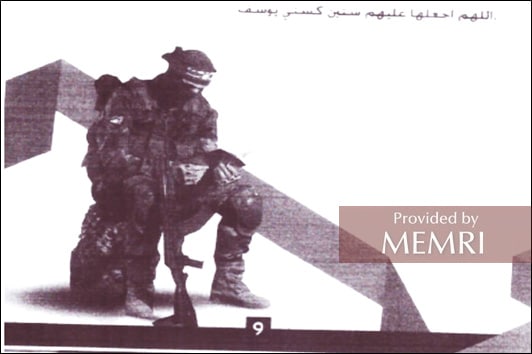
Inspirational illustration. Text reads: "… Inflict upon them [the Infidel Jews] years [of famine and drought] like the years of Joseph [Yusuf]."
* Dr. Eliyahu Stern is a researcher at the Hebrew University of Jerusalem and a Research Fellow at MEMRI.
[1] For the notion that those who fought without proper intention and were killed in battle do not attain the pleasures of paradise awaiting martyrs of pure intent, see the final paragraph of the entry authored by Etan Kohlberg – E. Kohlberg, "S̲h̲ahīd," Encyclopaedia of Islam, second edition, Referenceworks.brill.com/display/entries/EIEO/COM-1025.xml?rskey=namaWh&result=16.
[2] On niyya – intention – see for example A.J. Wensinck, "Niyya," Encyclopaedia of Islam, second edition - Referenceworks.brill.com/display/entries/EIEO/SIM-5935.xml?rskey=4b6R5p&result=1 .
[3] See for example Sunnah.com/muslim:142g .
[4] The term Abaqāhu, which should be translated as "leaves him," appears in here, whereas in the Hadith literature I searched, the verb awbaqahu is used.
[5] Sunnah.com/mishkat:3714The.
[6] English translation of the verse: Arthur Arberry, The Holy Koran.
[7] English translation of the verse: Arthur Arberry, The Holy Koran.
[8] English translation of the verse: Arthur Arberry, The Holy Koran.
[9] English translation of the verse: Arthur Arberry, The Holy Koran.
[10] One might suggest that the choice of these three sources, known for their association with the Hanbali school, is tied to the fact that prominent Hamas leaders, many of whom hold central positions in Gaza's educational system and the Islamic University, received their education in the 1970s and 1980s in Saudi Arabia, where the Hanbali school is prominent. However, it is important to note that the two medieval sources – Ibn Kathir and Ibn Qayyim Al-Jawziyya, both students of the renowned Hanbali scholar Ibn Taymiyya (d. 1328) – are also widely recognized outside of Saudi Arabia. The works of Ibn Taymiyya and Ibn Qayyim Al-Jawziyya have significantly influenced Sunni Islamist circles, and Abd Al-Rahman Al-Sa'di 's modern Qur'an commentary is particularly noted as a widely accessible "Salafi" interpretation (one can even listen to it recited online).
[11] For Ibn Kathir's text see Shamela.ws/book/1509/1854.
[12] See the words of al-Sa'di both in writing and audio at: Baheth.ieasybooks.com/ar/media/131-%D9%85%D9%86-415-%D8%AA%D9%81%D8%B3%D9%8A%D8%B1-%D8%B3%D9%88%D8%B1%D8%A9-%D8%A7%D9%84%D8%AA%D9%88%D8%A8%D8%A9-11-%D8%A7%D9%84%D8%A2%D9%8A%D8%A7%D8%AA-105-116-%D9%85%D9%86-%D8%AA%D9%81%D8%B3%D9%8A%D8%B1-%D8%A7%D9%84%D8%B3%D8%B9%D8%AF%D9%8A-%D9%83%D8%A8%D8%A7%D8%B1-%D8%A7%D9%84%D8%B9%D9%84%D9%85%D8%A7%D8%A1.
[13] Ulu al-'Azm is a Quranic term (Sura 46: 35) referring to the messengers of Allah who were resolute in facing difficult trials to fulfill His will.
[14] See: Shamela.ws/book/251/861 and Shamela.ws/book/251/862#p1.
[15] For the appearance of this tradition in sources, see for example Al-maktaba.org/book/31615/32108, Shiaonlinelibrary.com/%D8%A7%D9%84%D9%83%D8%AA%D8%A8/2131_%D8%A7%D9%84%D8%AA%D9%85%D9%87%D9%8A%D8%AF-%D8%A7%D8%A8%D9%86-%D8%B9%D8%A8%D8%AF-%D8%A7%D9%84%D8%A8%D8%B1-%D8%AC-%D9%A1/%D8%A7%D9%84%D8%B5%D9%81%D8%AD%D8%A9_237, Islamweb.net/ar/library/content/87/9567/%D8%A8%D8%A7%D8%A8-%D9%85%D8%A7-%D8%AC%D8%A7%D8%A1-%D9%81%D9%8A-%D8%A7%D9%84%D8%B4%D9%87%D8%A7%D8%AF%D8%A9-%D9%88%D9%81%D8%B6%D9%84%D9%87%D8%A7, Islamweb.net/ar/library/content/75/455/%D8%A8%D8%A7%D8%A8-%D8%A7%D9%84%D9%82%D9%88%D9%84-%D8%B9%D9%86%D8%AF-%D8%A7%D9%84%D8%A7%D9%86%D8%AA%D9%87%D8%A7%D8%A1-%D8%A5%D9%84%D9%89-%D8%A7%D9%84%D8%B5%D9%81-%D9%82%D8%A8%D9%84-%D8%AA%D9%83%D8%A8%D9%8A%D8%B1%D8%A9-%D8%A7%D9%84%D8%A7%D9%81%D8%AA%D8%AA%D8%A7%D8%AD,
[16] For the appearance of this tradition in sources, see for example Sunnah.com/tirmidhi:1650, Sunnah.com/mishkat:3830, Sunnah.com/riyadussalihin:1297.
[17] English translation of the verse: Arthur Arberry, The Holy Koran.
[18] Sunnah.com/adab:699. A similar formulation is found within a well-known duʿāʾ of the Prophet; see, for example, Sunnah.com/tirmidhi:3502, Sunnah.com/riyadussalihin:833, Sunnah.com/mishkat:2492.
[19] See Facebook.com/groups/142300052950947/?locale=th_TH.
[20] See, for example, Sunnah.com/tirmidhi:3584, Sunnah.com/mishkat:2440, Sunnah.com/riyadussalihin:1326, Sunnah.com/abudawud:2632, Sunnah.com/abudawud:5095, Sunnah.com/tirmidhi:3426, Sunnah.com/ahmad:471, Sunnah.com/ibnmajah:3886, https://dorar.net/hadith/sharh/79815, https://hadeethenc.com/ar/browse/hadith/5024, https://www.islamweb.net/ar/library/content/55/4495/%D8%A8%D8%A7%D8%A8-%D9%85%D8%A7-%D9%8A%D8%AF%D8%B9%D9%89-%D8%B9%D9%86%D8%AF-%D8%A7%D9%84%D9%84%D9%82%D8%A7%D8%A1, Sunnah.com/hisn:127.
[21] See for example: Sunnah.com/tirmidhi:3427, Sunnah.com/mishkat:2442, Sunnah.com/hisn:17, Sunnah.com/nasai:5486, Sunnah.com/ibnmajah:3884, Sunnah.com/nasai:5539 Sunnah.com/abudawud:5094, Sunnah.com/riyadussalihin:82, Sunnah.com/mishkat:2442, Islamweb.net/ar/fatwa/50426/%D8%B4%D8%B1%D8%AD-%D8%AD%D8%AF%D9%8A%D8%AB-%D8%A7%D9%84%D9%84%D9%91%D9%8E%D9%87%D9%8F%D9%85%D9%91%D9%8E-%D8%A3%D9%8E%D8%B9%D9%8F%D9%88%D8%B0%D9%8F-%D8%A8%D9%90%D9%83%D9%8E-%D8%A3%D9%8E%D9%86%D9%92-%D8%A3%D9%8E%D8%B6%D9%90%D9%84%D9%91%D9%8E-%D8%A3%D9%8E%D9%88%D9%92-%D8%A3%D9%8F%D8%B6%D9%8E%D9%84%D9%91%D9%8E
[22] See for example Sunnah.com/muslim:2708b, Sunnah.com/ibnmajah:3518, Sunnah.com/abudawud:3898, Sunnah.com/muslim:2708a, Sunnah.com/tirmidhi:3604b, Sunnah.com/tirmidhi:3437, Sunnah.com/hisn:216, Sunnah.com/riyadussalihin:1452, Sunnah.com/riyadussalihin:982, Sunnah.com/mishkat:2422, Sunnah.com/mishkat:2423, Sunnah.com/malik/54/35, Sunnah.com/malik/51/11, Sunnah.com/urn/6125970.
[23] See for example, Sunnah.com/ahmad:446, Sunnah.com/riyadussalihin:1457, Sunnah.com/hisn:86, Sunnah.com/adab:660, Islamweb.net/ar/fatwa/200257/%D8%A7%D9%84%D9%85%D8%B1%D8%AC%D9%88-%D9%84%D9%85%D9%86-%D8%AD%D8%A7%D9%81%D8%B8-%D8%B9%D9%84%D9%89-%D9%87%D8%B0%D9%87-%D8%A7%D9%84%D8%A3%D8%B0%D9%83%D8%A7%D8%B1-%D8%A7%D9%84%D8%AD%D9%81%D8%B8-%D9%85%D9%86-%D8%A7%D9%84%D8%B4%D8%B1%D9%88%D8%B1
[24] See for example Sunnah.com/search?q=%D8%A3%D8%B8%D9%84%D9%84%D9%86, Islamqa.info/ar/answers/114016/%D8%AF%D8%B9%D8%A7%D8%A1-%D8%AF%D8%AE%D9%88%D9%84-%D8%A7%D9%84%D9%82%D8%B1%D9%8A%D8%A9.
[25] See for example Sunnah.com/abudawud:1537, Sunnah.com/mishkat:2441, Sunnah.com/hisn:126.
[26] See for example Sunnah.com/tirmidhi:1682, Sunnah.com/mishkat:3948, Urdupoint.com/islam/hadees-detail/sunan-abi-dawud/hadees-no-14283.html, Islamqa.info/ar/answers/128740/%D8%AD%D9%85-%D9%84%D8%A7-%D9%8A%D9%86%D8%B5%D8%B1%D9%88%D9%86-%D9%84%D9%8A%D8%B3%D8%AA-%D8%AF%D8%B9%D8%A7%D8%A1-%D8%B9%D9%84%D9%89-%D8%A7%D9%84%D8%A7%D8%B9%D8%AF%D8%A7%D8%A1.
[27] See for example Sunnah.com/hisn:131 , Sunnah.com/bukhari:6392, Sunnah.com/mishkat:2426, Sunnah.com/muslim:1742b, Sunnah.com/ibnmajah:2796, Sunnah.com/bukhari:2933, Sunnah.com/tirmidhi:1678, https://shamela.ws/book/711/5396#p1 , https://shamela.ws/book/711/5398#p1, https://shamela.ws/book/96257/1198, Sunnah.com/riyadussalihin:1324, Sunnah.com/riyadussalihin:53, Sunnah.com/mishkat:3930, Sunnah.com/abudawud:2631, Sunnah.com/bukhari:2965, Sunnah.com/muslim:1742a, Sunnah.com/bukhari:3024,
https://islamweb.net/ar/fatwa/2603/%D8%A7%D9%84%D8%AF%D8%B9%D8%A7%D8%A1-%D8%A7%D9%84%D8%B0%D9%8A-%D8%AF%D8%B9%D8%A7-%D8%A8%D9%87-%D8%A7%D9%84%D9%86%D8%A8%D9%8A-%D8%B5%D9%84%D9%89-%D8%A7%D9%84%D9%84%D9%87-%D8%B9%D9%84%D9%8A%D9%87-%D9%88%D8%B3%D9%84%D9%85-%D9%8A%D9%88%D9%85-%D8%A7%D9%84%D8%A3%D8%AD%D8%B2%D8%A7%D8%A8, https://quran.com/al-anfal/46/tafsirs,
[28] See for example (with some variations in several versions of this tradition): Sunnah.com/abudawud:1555, Sunnah.com/bukhari:6369, Sunnah.com/bukhari:5425, Sunnah.com/hisn:137, Sunnah.com/hisn:121, Sunnah.com/mishkat:2458, Sunnah.com/bukhari:6369, Sunnah.com/adab:672, Sunnah.com/nasai:5476, Sunnah.com/adab:801, Sunnah.com/nasai:5449, Sunnah.com/bukhari:6371, Sunnah.com/tirmidhi:3572
[29] See for example, https://shamela.ws/book/12031/131, https://www.islamweb.net/ar/library/content/1019/1192/%D8%A8%D8%A7%D8%A8-%D9%85%D8%A7-%D8%B0%D9%83%D8%B1-%D8%B9%D9%86-%D8%A7%D9%84%D9%86%D8%A8%D9%8A-%D8%B5%D9%84%D9%89-%D8%A7%D9%84%D9%84%D9%87-%D8%B9%D9%84%D9%8A%D9%87-%D9%88%D8%B3%D9%84%D9%85%D8%8C-%D9%81%D9%8A-%D9%81%D8%B6%D9%84-%D8%B3%D8%B9%D8%AF, https://www.islamweb.net/ar/library/content/1019/1192/%D8%A8%D8%A7%D8%A8-%D9%85%D8%A7-%D8%B0%D9%83%D8%B1-%D8%B9%D9%86-%D8%A7%D9%84%D9%86%D8%A8%D9%8A-%D8%B5%D9%84%D9%89-%D8%A7%D9%84%D9%84%D9%87-%D8%B9%D9%84%D9%8A%D9%87-%D9%88%D8%B3%D9%84%D9%85%D8%8C-%D9%81%D9%8A-%D9%81%D8%B6%D9%84-%D8%B3%D8%B9%D8%AF, https://www.islamweb.net/ar/library/content/74/6004/%D8%A7%D8%B3%D8%AA%D8%AC%D8%A7%D8%A8%D8%A9-%D8%AF%D8%B9%D8%A7%D8%A1-%D8%B3%D8%B9%D8%AF-%D9%81%D9%8A-%D8%AD%D9%82-%D8%B1%D8%A7%D9%83%D8%A8-%D8%B3%D8%A8-%D8%B9%D9%84%D9%8A%D8%A7
[30] See for example. https://shamela.ws/book/122397/763, Sunnah.com/abudawud:3067,
[31] See for example, https://al-maktaba.org/book/31621/30010, https://masri.world/returning-home-from-the-hajj-trip, https://www.alsunna.org/hajj2.htm, https://www.islamweb.net/ar/library/content/25/3004/?idfrom=&idto=&start=, https://taqrib.ir/ar/library/content/6217/1624, Sunnah.com/bukhari:4116, Sunnah.com/bukhari:1797, Sunnah.com/bukhari:2995, Sunnah.com/muslim:1344a, Sunnah.com/mishkat:2425, Sunnah.com/urn/509480, Sunnah.com/abudawud:2770, Sunnah.com/riyadussalihin:977, Sunnah.com/bukhari:3084, https://www.islamweb.net/ar/library/content/6/12479/%D9%85%D8%B3%D9%86%D8%AF-%D8%A3%D9%86%D8%B3-%D8%A8%D9%86-%D9%85%D8%A7%D9%84%D9%83-%D8%B1%D8%B6%D9%8A-%D8%A7%D9%84%D9%84%D9%87-%D8%B9%D9%86%D9%87
[32] The use of du'a recitations for oppressed Muslims and against the unbelievers is known to be a common practice in times of hardship. See for example, Menahem Milson, "دعاء القنوت", in: Menahem Milson, The New Arabic-Hebrew Dictionary, The Hebrew University of Jerusalem and The Middle East Media Research Institute, 2023, p. 192.
For sources mentioning this du'a see for example, https://www.islamweb.net/ar/article/228157/%D8%A7%D9%84%D9%84%D9%87%D9%85-%D8%A3%D9%86%D8%AC%D9%90-%D8%A7%D9%84%D9%85%D8%B3%D8%AA%D8%B6%D8%B9%D9%81%D9%8A%D9%86-%D9%85%D9%86-%D8%A7%D9%84%D9%85%D8%A4%D9%85%D9%86%D9%8A%D9%86 , https://hadeethenc.com/ar/browse/hadith/8297, Sunnah.com/bukhari:6200, Sunnah.com/nasai:1073, Sunnah.com/ibnmajah:1244, Sunnah.com/bukhari:2932, Sunnah.com/bukhari:3386, Sunnah.com/bukhari:6393, Sunnah.com/bukhari:1006 , Sunnah.com/abudawud:1442, Sunnah.com/nasai:1074, Sunnah.com/urn/6115630 , Sunnah.com/bukhari:6940, Sunnah.com/bukhari:4598, Sunnah.com/muslim:675c, Sunnah.com/bukhari:804, Sunnah.com/mishkat:1288, Sunnah.com/bukhari:4560 , Sunnah.com/muslim:675a




